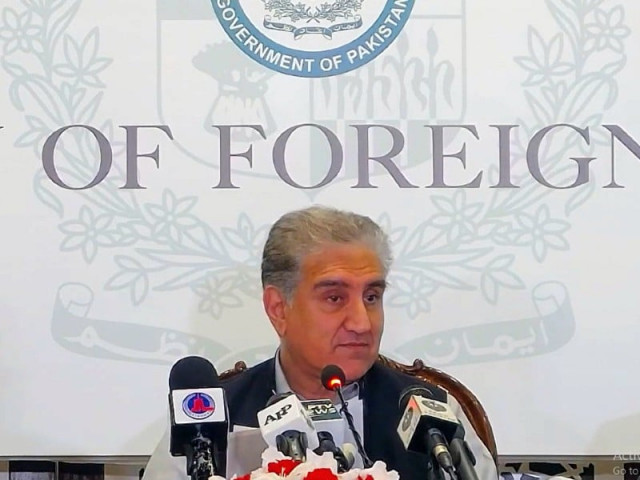Pakistan steps up diplomatic efforts for inclusive Afghan setup
Foreign Minister Qureshi embarks on four-nation regional trip

Pakistan has been working with immediate neighbours of Afghanistan as well as other key stakeholders, as Islamabad steps up its diplomatic efforts for “an inclusive and broad-based government” despite the outright takeover of Kabul by the Taliban.
The move came as Qureshi arrived in Tajikistan capital Dushanbe late on Tuesday night in the first leg of his four-nation tour. At the airport, he was received welcomed by Tajikistan's Deputy Foreign Minister
Farhod Salim, Pakistan's Ambassador to Tajikistan Imran Haider and senior embassy officials.
Qureshi will meet with his Tajik counterpart Sirojiddin Muhriddin on Wednesday (today). The Foreign Minister will also visit the Presidential Palace and meet with the President of Tajikistan Emomali Rahmon.
Officials said Pakistan has been working to develop consensus on the way forward for Afghanistan. In this regard, Foreign Minister Shah Mahmood Qureshi is undertaking a crucial trip to the regional countries that would take him to Tajikistan, Uzbekistan, Turkmenistan and Iran.
“Foreign Minister Makhdoom Shah Mahmood Qureshi will undertake visits to Tajikistan, Uzbekistan, Turkmenistan and Iran from 24-26 August 2021,” the Foreign Office said in a statement issued here on Tuesday.
The Foreign Office said that the Qureshi would have high-level interactions to exchange views on the evolving situation in Afghanistan and on enhancing bilateral relations. In the consultations, he would share Pakistan’s perspective on the latest developments in Afghanistan, it added.
“Pakistan believes that the neighbouring countries have a vital stake in the peace, security and stability of Afghanistan and the region,” the statement read. “It is important to coordinate closely with the neighbours to address common challenges and advance shared goals of peace, security, stability and regional connectivity.”
The purpose of the diplomatic initiative is to adopt a joint stance on the Afghan situation. The main issue facing not just Pakistan but other countries as well is that whether the new government, likely to be led by Afghan Taliban, should be recognised or not.
Pakistan, as per officials, is working with other regional countries and likely to take a decision with consensus instead of taking a solo flight.
Unlike the past when Pakistan was among the only three countries which had recognised the Taliban rule in the late 90s, this time countries like China and Russia are keen to work with the new political dispensation with Afghanistan.
President Joe Biden has also indicated that the US might not treat the Taliban regime the same manner as it did in the past but insisted that it would depend on the conduct of the Taliban.
Official sources said that Pakistan had been quietly telling the Taliban leaders that they would have to accommodate other political figures in the future setup and ensure the protection of human and women rights. This, according to officials, is important for the Taliban to get international legitimacy.
Kabul fell to the Taliban on August 15 but since then there has been no clarity about a future setup. One of the reasons behind the delay is that the Taliban are seeking to bring other political parties and figures on board before announcing the new government.
A Pakistani official said that the Taliban were aware of the fact that if they were not given the international legitimacy that could create lots of problems for theme in running the country on a sustained manner.
The US has already frozen foreign assets of Afghanistan while the International Monetary Fund (IMF) had suspended its emergency assistance for the country. Without foreign aid and help of the international financial institutions Afghanistan would face multiple challenges, including rising inflation.
Since the US and other foreign forces are almost done with the withdrawal; they are likely to use the economic leverage to persuade Taliban to change their behaviour.



















COMMENTS
Comments are moderated and generally will be posted if they are on-topic and not abusive.
For more information, please see our Comments FAQ